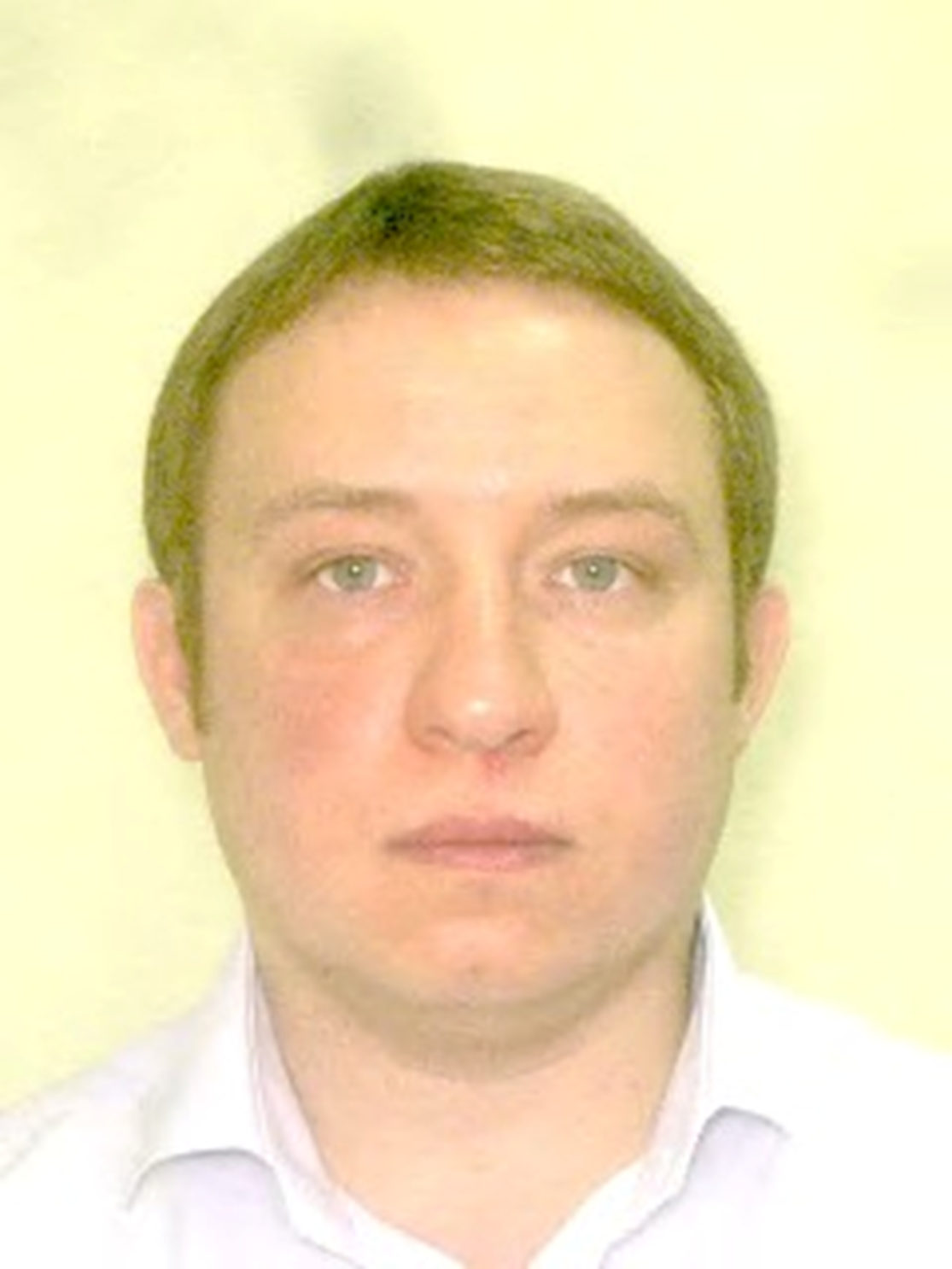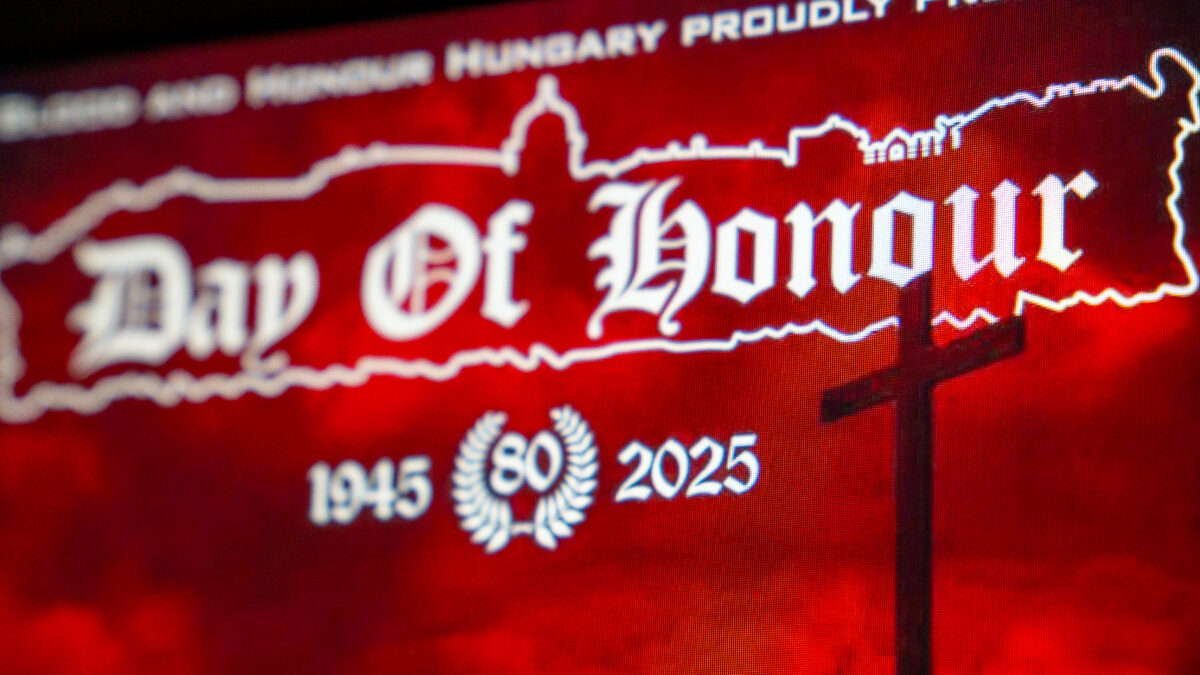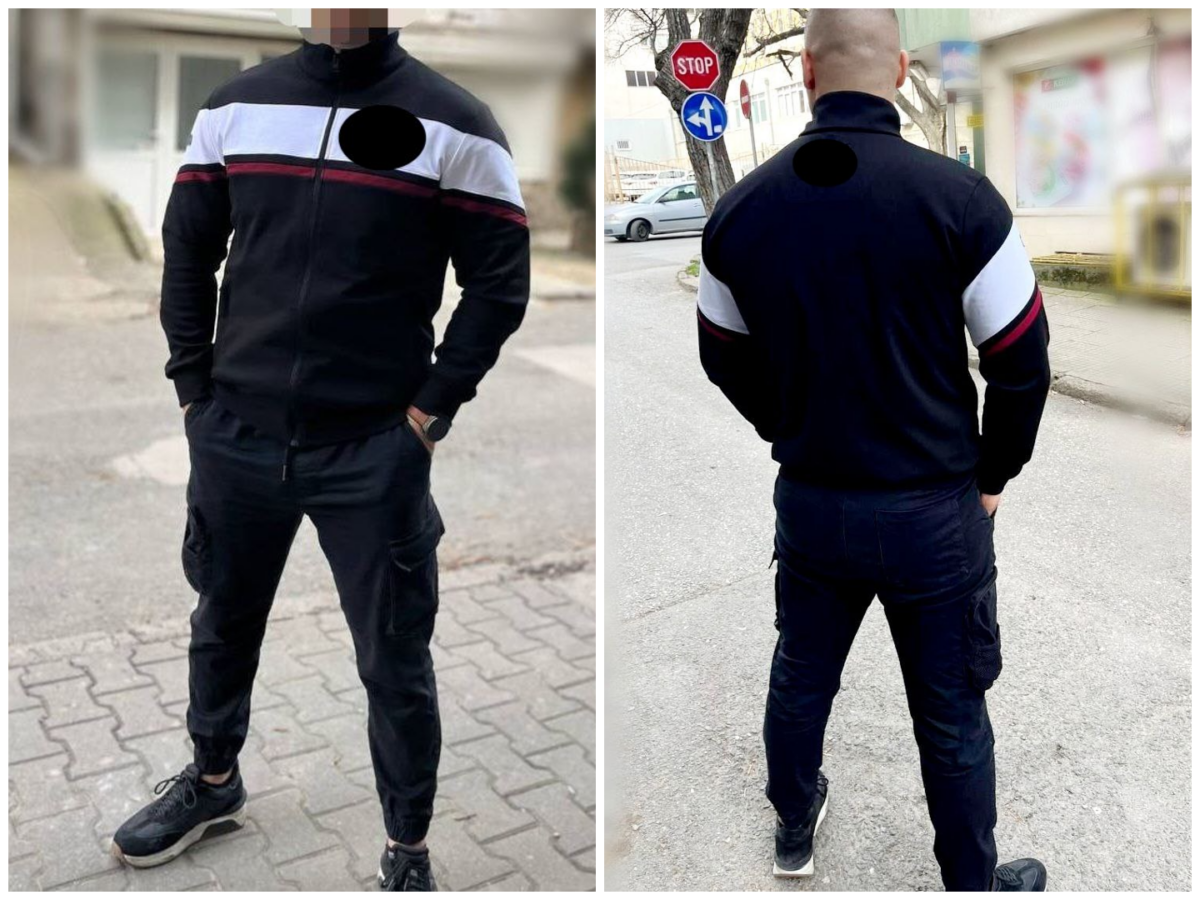Lega Nord's Bedfellows: Russians Offering Illicit Funding to Italian Far-Right Party Identified
In a previous joint investigation with BuzzFeed News and the Insider, Bellingcat disclosed the inordinately frequent travel of two Italian politicians from the close circle of the head of Italy’s far-right party Lega Nord, and self-styled “Italian Trump” Matteo Salvini. As previously reported by Italian media and BuzzFeed, one of the frequent travelers and advisers to Italy’s deputy prime minister – Gianluca Savoini – took part in a meeting in Moscow last October with three so-far unidentified Russian speakers.
At that meeting, which took place at the Metropol hotel and was surreptitiously recorded (likely by one of the participants) – Savoini and his Russian counterparts discussed an illicit scheme to secure funding for Italy’s far-right party in the upcoming European parliament elections. The funding – in the millions of Euro – was to be funneled via artificially under-priced Russian oil export transactions, allowing room for a “value added” allocation to a sham broker, which was to be secretly channeled to Lega Nord.
During the meeting, the audio recording of which was obtained by BuzzFeed, Savoini can be heard repeatedly pledging political support to Russia in the context of the “common interests” between the Kremlin and Europe’s extreme right.
The disclosure of the meeting and its purported goals have rocked Italian politics, and prosecutors in Milan are investigating the proposed deal. Salvini himself did not attend the Metropol meeting, but was in Moscow at the time. He has consistently refused to answer questions about whether he knew the meeting was taking place or was aware of the proposed oil deal.
Three Russian male voices can be heard in the recording published by BuzzFeed. During their deliberations on how best to structure the funding scheme, they refer to leading Russian political figures with whom the project needs to be coordinated – including Vladimir Pligin and the “deputy prime minister”, arguably referring to Dmitry Kozak. The three men’s identities have, however, remained unknown until this investigation.
A joint investigation by Bellingcat, BuzzFeed News, and the Insider (Russia) has been able to identify two of the three Russian voices heard on the recording.
Who are the two men?
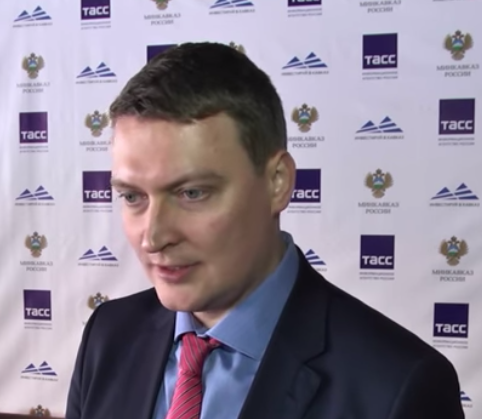
Ilya Yakunin, screen-grab from a television interview (2017)
These two men identified as part of the Metropol conversation are Andrey Yuryevich Kharchenko and Ilya Andreevich Yakunin. In the recording they can be heard (switching back and forth between English and Russian) presenting the funding scheme to their Italian guests, and referring to Russian politicians and government officials who need to approve the plan before it can be put into action.
Kharchenko is directly linked to Russian far-right ideologist Aleksandr Dugin, while Yakunin – a former state company functionary with an investment background – is linked to Vladimir Pligin, a high-profile politician from the ruling “United Russia” party.
Alexander Dugin has long strategized to create a network of Kremlin-loyal politicians from among the European extreme right, and has touted his good contacts with Italy’s Lega Nord. He has been supported – and largely funded – by Russian oligarch Konstantin Malofeev, who is on the EU sanctions list over his involvement in funding the initial stage of Russia’s invasion into Ukraine.
Vladimir Pligin played a major role in one of Putin’s most hostile foreign policy moves: drafting a law in the country’s parliament certifying the 2014 annexation of Crimea. Neither Dugin nor Pligin attended the October 18 Metropol meeting, but both were mentioned on the recording. A third Russian voice, as yet unidentified, declared that they needed Pligin’s “green light” before moving forward with the negotiations. The day before the meeting, Dugin was photographed meeting with Savoini, while Salvini reportedly met with the Russian deputy prime minister Dmitry Kozak at Pligin’s office. Kozak is also referred to in the recording as someone needed to bless the funding scheme, although he is not directly mentioned by name.
Bellingcat, BuzzFeed News and the Insider also analyzed travel and company records, online and social media activity, as well as information contained in other databases, to piece together a profile of Yakunin and Kharchenko along with their links to Dugin and Pligin.
We established that Yakunin’s connection to Pligin long predates the Metropol meeting. In 2002, Yakunin took up a management position at the Agency of Direct Investments, a firm which focuses on major industries including oil and gas. The firm was controlled by a company that counts Pligin as one of its six founders and shareholders, records discovered by Bellingcat show. An employee at the Agency told BuzzFeed News that Yakunin no longer works at the company.
A long-serving member of Putin’s United Russia party, Pligin is also a former senior member of parliament. His work on legislation to annex Crimea landed him on a European Union sanctions list. He co-founded a law firm with deputy prime minister Kozak, a power broker — known as the “Cheshire Cat” because of his smile — who served as Putin’s chief of staff when he first became president, and whom the US recently put on its sanctions list as a “member of the Russian leadership’s inner circle.” Pligin was also a student of Anatoly Sobchak, the former mayor of St. Petersburg known for kickstarting Putin’s political career.
The Metropol Hotel group’s ties to Dugin come from Kharchenko, who has been quoted in Russian media as an employee of Dugin’s political entity, the International Eurasian Movement.
But other details raise questions about what, exactly, Kharchenko does for a living. His name is nowhere to be found on the organisation’s website, and a senior officer at the International Eurasian Union’s headquarters contacted by the Insider had not heard of him. Adding to the mystique around Kharchenko, according to two sources with access to Russian tax databases, his tax records for the past five years are empty, showing no official income. At the same time, we have established that “Andrey Kharchenko” is an authentic identity and not a cover name. Born in Azerbaijan in March 1980, he became a Russian citizen 15 years later, and appears to be a disciple of Dugin, judging by the fact that the latter oversaw Kharchenko’s PhD in philosophy. Kharchenko’s 137-page dissertation focuses on the destructive potential of global population mobility, and the negative moral connotations of taking selfies.
https://www.instagram.com/p/BkN7uNoAviN/?utm_source=ig_embed
Asked in a brief phone interview with the Insider last month why there was so little information about him online, Kharchenko said that he often published his writings using a pseudonym, but declined to say what it was.
Kharchenko has traveled with Dugin on a number of foreign trips, including a November 2016 visit to Crimea to host a Turkish delegation which included a self-styled adviser to President Recep Tayyip Erdogan. He also traveled with Dugin to Ankara earlier that same month, where they – accompanied by a former deputy-chair of Russia’s parliament’s foreign affairs committee with links to Konstantin Malofeev and to an anti-liberal think-tank reporting to the Russian president – met with a mix of mainstream and fringe Turkish politicians, allegedly to kick-start then ailing Russian-Turkish relations.
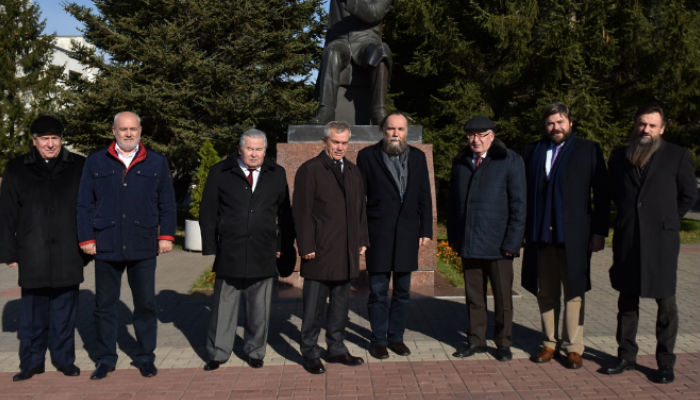
Oleg Lebedev, second from left, is chair of the civic council at RISS, a Kremlin think-tank. Posing with Dugin (5 from left) and Konstantin Malofeev (second from right).
Notably, on that trip, Kharchenko used a service passport, a document only made available to government or state employees, or to executives of state-owned companies. Given his absence of recent tax records, it was not possible to establish what state-linked entity had sponsored his special passport.
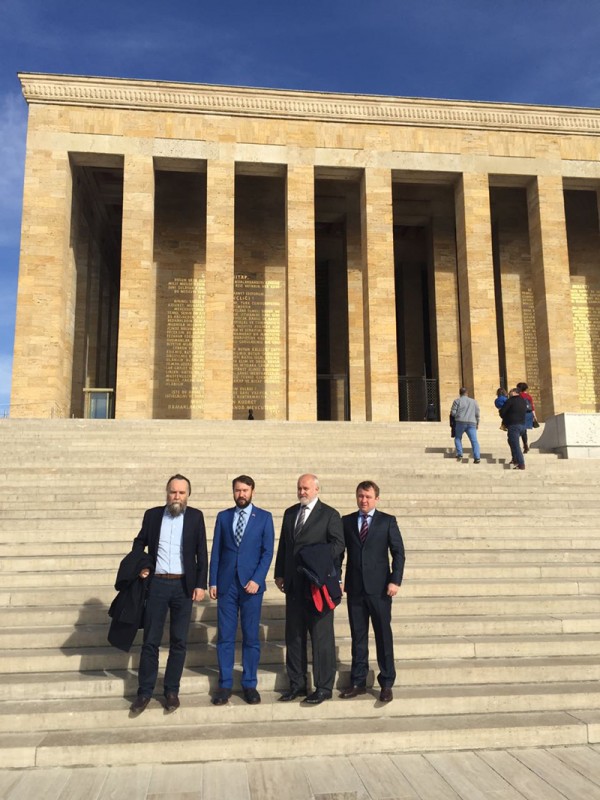
Kharchenko, Dugin and Lebedev during their trip to Ankara, November 2016
When Dugin met with Savoini the day before the Metropol meeting, an Italian journalist posted a photograph on Twitter showing them standing with another, unidentified man. Based on a juxtaposition of relative body measurements — such as the length of his arms relative to his height, as well as his posture and hair shape — to other photos of Kharchenko standing next to Dugin, it is likely that this is indeed Kharchenko. However, because of the lack of specific features in the tweeted image, for example his ears aren’t properly visible, it is not possible to provide a definitive forensic match.
Savoini, presidente Lombardia-Russia- nel giorno della visita di #Salvini a #Mosca – con Aleksandr #Dugin, studioso vicino movimenti sovranisti europei. Non si parlava di politica, dicono, ma di organizzare una “mostra di artisti eurasiatici” in Italia. pic.twitter.com/wX8Z9rHjnD
— Marta Allevato (@MartaAllevato) October 17, 2018
While much of Kharchenko’s background remains a mystery, a lot more can be pieced together about Yakunin. A LinkedIn profile claiming to belong to Yakunin suggests that he attended the prestigious Moscow State Institute of International Relations. This university is run by the Ministry of Foreign Affairs and is well-known for educating the country’s top diplomats and intelligence officers.
Yakunin has spent much of his career working for firms with strong links to the Russian state. According to one news report, he has worked closely with some of Russia’s biggest companies, including Gazprom and Russian Railways. In 2016, he was appointed deputy director general of the state-owned North Caucasus Development Corporation, a firm created to attract investments and implement major infrastructure projects in the region. It was founded in 2010 by Vnesheconombank, a state-funded development bank under US Treasury sanctions. Two years ago the bank transferred control of the corporation directly to the Russian state.
An employee at the North Caucasus Development Corporation told BuzzFeed News that Yakunin no longer worked there.
More recently, Yakunin has referred to himself as the deputy director general of a new company called the Eurasian Trade and Logistics Centre. Records show that the company was created in February 2018. Its director, Vladimir Georgievich Sobinsky, is a member of the United Russia party and an influential politician in Karelia, a region in the country’s northwest.
One of the Centre’s shareholders is a company controlled by the Russian conglomerate Sistema, a multi-billion-dollar investment company listed on the London Stock Exchange and run by the billionaire Vladimir Yevtushenkov. Reached on the phone on Monday, a spokesperson at the Centre told BuzzFeed News that Yakunin doesn’t work there, and hung up. Sistema did not respond to requests for comment.
How we identified the two men
The identities of Yakunin and Kharchenko were established through an iterative process of seeking out people having the first names matching those heard on the recordings (“Ilya”, “Andrey” and “Yury”), among hundreds of possible candidates within the business and personal circles of the people name-checked during the meeting. Then, the investigative team sought out audio samples from the voices of the short-listed candidates in order to compare their voices to the samples from the leaked recording of the Metropol hotel meeting.
Ilya Yakunin was short-listed as a former employee of a Pligin-owned company and a recent government investment-agency executive, and was also mentioned – with no context – in an earlier Espresso story about the Metropol hotel meeting. We found a sample of his voice in an interview he gave to a regional Russian television channel in December 2017.
Andrey Kharchenko – who holds an obscure yet nominally important position of “Near-East director” of Dugin’s International Eurasian Union – had no video presence in open sources. A sample of his voice was captured by the Insider during a telephone call last week.
An analysis by Bellingcat comparing voice intonation, speech mannerisms, and fundamental vocal frequencies has determined with a high degree of confidence that Kharchenko’s and Yakunin’s voices match two of the men on the Metropol tape.
The recordings of Yakunin’s voice has been sent to specialists at the National Center for Media Forensics at the University of Colorado Denver for a full forensic analysis. (The audio quality of Kharchenko’s voice on the Metropol tape is not high enough for a forensic-level analysis)
We approached both Yakunin and Kharchenko with a list of detailed questions about the Metropol hotel meeting. They did not respond by press time.
We also contacted Vladimir Pligin and inquired about the context in which his name was invoked at the meeting, and introduced him to the names identified by us as hosting the meeting and dropping his name. He said that he has no connection to such people, thus directly contradicting the records showing Yakunin managed a company under his joint control.
Why do these names matter?
Italian prosecutors have announced that they are looking into whether Savoini and the two other Italians at the meeting had engaged in “international corruption.” In this context, the identity of the individuals who – together with Savoini – plotted the illicit scheme for diverting Russian export proceeds to a political party is highly relevant. Any criminal investigation will seek to identify the ultimate funding source, and whether a state or a private group was seeking to sponsor a party – and what its interests and expectations would have been.
Given that the identified persons attending the meeting were not business people with their own agency, or wealthy individuals sacrificing their own funds for a like-minded political cause, questions arise as to who was expected to pick up the tab. The two men appear equally linked to the Russian state, as well as to wealthy Russian oligarchs, some of them under EU sanctions.
These revelations have come at the same time that the Italian government has spun into crisis and collapsed, after Salvini pulled the plug on his coalition with the populist Five Star Movement. Prime Minister Giuseppe Conte said he would step down, and during his resignation speech lambasted Salvini over his refusal to address parliament about the Metropol revelations or share any information about it with Conte’s office. Salvini has tried to force a snap election, but that looks to have failed. The Five Star Movement is now on the brink of forming a new government with the centre-left Democratic Party, a move which would mean Salvini would lose his job as deputy prime minister and interior minister.
Salvini has refused to answer an avalanche of questions from MPs and reporters about what he knows about the meeting. He and Savoini did not respond to requests for comment for this article.
Aside from Savoini, two other Italian men attended the Metropol meeting. Both men — an international lawyer called Gianluca Meranda and Francesco Vannucci, a consultant and banking expert — have come forward since the recording was exposed. They both deny wrongdoing and say a deal was never completed.
Only one man from that meeting remains unidentified: A third Russian man, referred to as “Yuri.”
